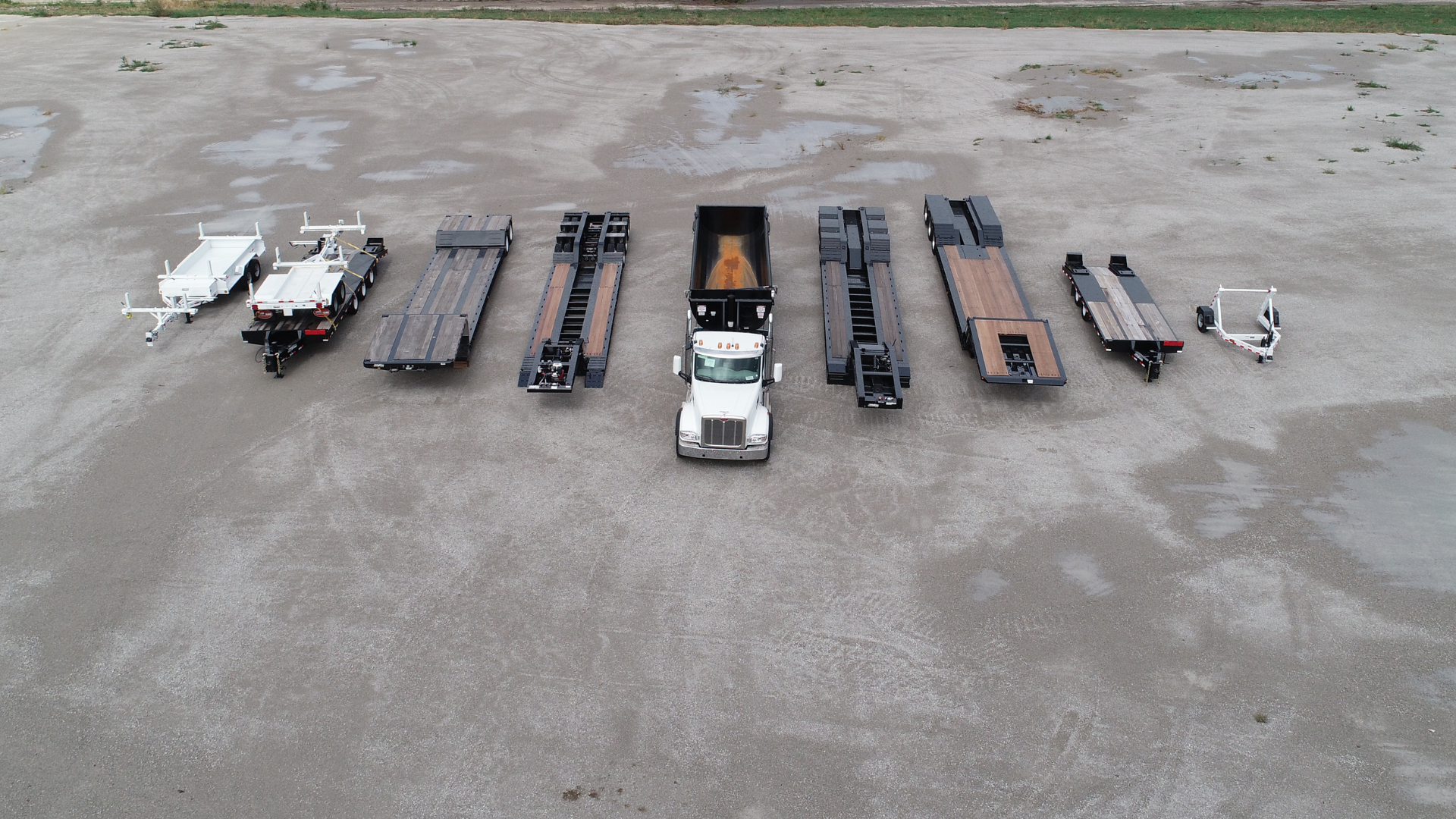
As winter sets in, many roads become snowy and icy. Your fleet vehicles likely can’t avoid these conditions, so they often travel through thick snow or over slippery roads. Another challenge is the salt and de-icing chemicals applied to the road to combat these conditions.
Unfortunately, those substances can cause corrosion on your trailers, shortening their life spans. Hydraulic gooseneck trailers are particularly susceptible to these de-icing chemicals and require specialized care. When winter precipitation and the methods used to combat it become an issue, Custom Truck One Source is here to help you maintain your trailers.
The Damaging Effects of Salt and De-Icers on Trailers
Salt and de-icing solutions contain chemicals such as sodium chloride, calcium chloride and magnesium chloride. These chemicals dissolve in water to form an aqueous solution that reduces the water’s freezing point, preventing the buildup of ice. As a result, the water stays in its liquid phase and does not freeze.
Unfortunately, these chemicals also weaken metallic surfaces, causing corrosion. When a trailer is hauled over a road treated with de-icer, the liquid that splashes up from the tires has the potential to cause this damage. Corrosion then speeds up the aging process and weakens the trailer’s structural integrity. The weakened surfaces pose several risks, considering the heavy loads that trailers carry.
You may be unable to stop your trailers from contacting these chemicals, but you can reduce their effects. It’s imperative to address these corrosive outcomes sooner rather than later, as failing to maintain your trailer’s undercarriage could lead to a road accident, especially in harsh weather and dangerous conditions.
The Specific Challenges for Hydraulic Gooseneck Trailers
Gooseneck trailers can carry large amounts of weight with ease, making them incredibly valuable to various fleets. However, gooseneck trailers face specific challenges in the face of de-icers. The hydraulic jacks they use for support are placed near the front of their frames, leaving these vital components vulnerable to splashing from the towing vehicle. These jacks must be able to support significant weight, so any corrosion they suffer compromises their ability to function and introduces considerable risk.
Similarly, gooseneck models with hydraulic dovetail ramps have essential components attached to the undercarriage to support their raising and lowering functions. The placement of these hydraulic systems makes them vulnerable to de-icer exposure and damage.
Salt and de-icer damage on any trailer is a concern, but it’s especially important to be aware of the risks and take steps to mitigate them on hydraulic gooseneck models you rely on to transport heavy loads.
5 Tips for Protecting Your Trailer During Winter
Fortunately, protecting hydraulic gooseneck trailers is easy with the right products and techniques. Custom Truck One Source is here to help you maintain your trailers in winter and mitigate the harmful effects of road salts and de-icers. Here are five valuable winter trailer care tips:
- Regular Cleaning and Washing
Between mud, snow, and road salts, trailers tend to get dirtier in winter. It’s essential to clean and wash your trailer regularly throughout winter to remove excess road salts and de-icing chemicals from their frames. Be sure to wash your trailer with an acidic or neutral cleaner and rinse it thoroughly. Using an alkaline cleaner will only move the salt particles around instead of removing them.
- Rust Prevention
You can prevent the formation of rust by removing road salts from your trailer immediately after using it. The longer these substances stay on the surface, the more damage they cause. Another undercarriage rust prevention method that works with cleaning is applying a protective coating or marine grease to the surface to discourage a buildup of corrosive chemicals.
- Lubrication of Key Components
Many people underestimate the importance of lubricating moving components. It is especially crucial to lubricate your trailer components if they have not been used in a while or after they have come into contact with road salts and de-icers. Remember to grease all moving components, including the hinges, locks, suspension components and hitch parts.
- Storage and Shelter Options
If you don’t use your trailer as often in winter, it’s wise to store it somewhere safe, such as in a secure garage or under a canopy with a concrete pad to guard the tires.
It’s also vital to clean it up before you store it. Leaving dirt or corrosive chemicals on your trailer for a sustained period will result in rust and other damage. By keeping your trailer well-protected during winter, you ensure it will be ready for action when spring arrives.
- Routine Inspections
Commercial trailers require frequent inspections to ensure they meet safety requirements. It’s essential to inspect your trailer daily to ensure it is not a hazard on the road. During these daily inspections, train your team to check these components:
- Tire pressure
- Lights
- Brakes
- Safety chains
- Lug nuts
- Warning equipment.
Annual inspections are more detailed and will include evaluations of components such as:
- Chassis
- Brake controls
- Electrical systems
Product Recommendations for Winter Trailer Care
One of the easiest ways to remove road salts from your trailer is with vinegar and warm water. Mix one part vinegar with 16 parts warm water and use a sponge or spray bottle to apply the solution. Avoid mixing other cleaning products with vinegar, as this may release harmful gases. Remove the vinegar solution from your trailer after a few minutes.
You can also remove de-icers with specialized detergents that dissolve the road salts and leave a protective coating to prevent future buildups. Regularly applying marine grease to your trailer will help prevent rust and protect the paint job.
The Role of Maintenance Professionals
You will experience the best results when you entrust your trailer maintenance to a professional. Maintenance experts patiently inspect each component and assembly to identify problem areas and provide solutions.
If you notice severe corrosion on your trailer, be sure to call an expert and have the damage repaired before taking it back out on the road.
Contact Custom Truck One Source for Trusted Trailer Maintenance
At Custom Truck One Source, we have a team of experts ready to help you combat salt and de-icer damage to trailers. We can conduct repairs on any type of hauler, and we can provide valuable guidance on how to protect your hydraulic gooseneck or other specialized trailer.
Contact us today to schedule an appointment.



